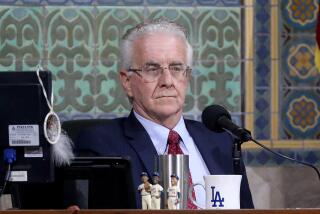Faster Pace for Gorbachev Plan Wins Party OK
- Share via
MOSCOW — Soviet leader Mikhail S. Gorbachev won the approval of the Communist Party’s policy-making Central Committee on Friday for an accelerated timetable of political and economic reforms that will transform the country’s government over the next year.
“We must not lose time,” he told the committee. “We must act, and act decisively, in resolving practical problems that are becoming increasingly and politically acute.”
Outlining plans to implement the broad decisions approved at a special party conference four weeks ago, Gorbachev made clear his intention to maintain and increase the pace of change here.
“The time for vigorous action has come, and we must not tarry,” he repeatedly told the Central Committee, demanding that the momentum built up over the last three years, particularly for the party conference, be put into implementing sweeping political changes.
Hits Conservative Foes
He particularly demanded an end to the still-strong conservative opposition to the reforms, calling for the removal in forthcoming elections of party officials blocking the changes.
And he called for even bolder measures to free the Soviet economy from rigid central planning and to open it to the market forces of competition in order to boost production and increase efficiency.
Resolutions approved by the committee call for a series of constitutional amendments and new laws strengthening governmental bodies on all levels, nationwide elections based on the principle of political competition, the withdrawal of Communist Party officials from day-to-day management of the economy and the reorganization and streamlining of the party itself.
The basic reforms were approved at the special party conference, and the resolutions were described by Gorbachev as implementing measures, though they clearly were intended to reinforce the conference decisions.
The Kremlin leader’s speech to the session, held in Central Committee headquarters in the heart of Moscow, was phrased in terms suggesting that he felt an urgent need to press ahead. The text of his speech was released Friday night by Tass, the official news agency, along with a summary of the decisions.
Signaling major changes within the 20-million-member party, Gorbachev said that the future basis for party leadership, from the grass roots to the Central Committee and Politburo, would be action to support perestroika, as his reform program is known.
‘Inert Forces’ Denounced
“Resistance comes still from the inert, conservative forces that would like to soft-pedal the reforms using the slightest pretexts, hitches and miscalculations that arise,” Gorbachev said. “Such people should be removed from their high posts, those who stand in the way of the reforms.”
The Kremlin leadership emerged unchanged, however, from the one-day meeting of the committee, although Soviet observers had speculated about possible changes in the 13-member Politburo and in the Central Committee.
Gorbachev apparently preferred to avoid a confrontation with more conservative elements within the party hierarchy at this time, perhaps anticipating that many will be removed during the process of reorganization that will start in the autumn.
“The time of action and concrete deeds has come,” Gorbachev told the Central Committee, whose 300 members include many of his most powerful conservative opponents and relatively few radical reformers.
The 57-year-old Soviet leader added that he believes that the party should be reduced “significantly” in size to include only the vanguard of Soviet society. At present, fewer than 10% of Soviet adults are admitted as party members.
Purge of ‘Idle and Corrupt’
Party membership rolls are to be reviewed before the end of the year. That process will be used, he implied, to purge the idle and corrupt--and possibly to strengthen his own power base by ousting conservative opponents.
Debate at the special party conference four weeks ago had shown that the country supports perestroika, Gorbachev said, but it also demonstrated the strength of opposition to it in “conservative sentiments, longing for the past, attempts to sow doubts, to portray perestroika not as a historic endeavor but almost as a social destabilization.”
The committee agreed to set up a special commission, headed by Gorbachev as the party’s general secretary, to prepare further proposals on implementing political reforms, apparently giving him a freer hand to deal with conservative opposition.
Under the timetable outlined by Gorbachev for further political reforms, constitutional amendments establishing a new governmental system vesting political power in a series of popularly elected local and regional councils and in a new national legislature will be debated in October and November.
The country’s first competitive parliamentary elections in decades will follow in March, and the establishment of a new Supreme Soviet with full legislative powers in April. The new Parliament will elect an executive president, expected to be Gorbachev.
Shift from Central Planning
The Soviet leader also outlined further economic reforms to shift the country from central planning to market forces in many spheres and introduce competition as widely as possible in commerce and industry.
“The direction of the economic reform has been chosen correctly,” he said, summing up the debate at the party conference over economic policies, but he said there was debate over the scope and speed of the reforms and the way they were implemented.
The problems raised, notably severe consumer shortages and failure of the initial industrial reforms to increase production substantially, were cited as proof of the need for even stronger measures.
In agriculture, Gorbachev called for greater reliance on family farming, breaking with 50 years of rural collectivization, in order to increase food supplies.
He also called for greater use of economic incentives to encourage the production of consumer goods by industry.
Joint party-government task forces have been established and given deadlines, he said, to resolve the problems of acute shortages of foodstuffs, housing and consumer goods.
More to Read
Sign up for Essential California
The most important California stories and recommendations in your inbox every morning.
You may occasionally receive promotional content from the Los Angeles Times.











